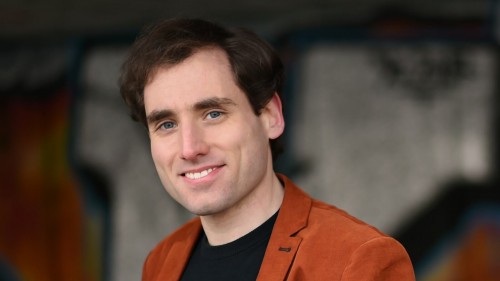 United Kingdom Rachmaninoff, Schubert: Boris Giltburg (piano), BBC National Orchestra of Wales / Alexander Vedernikov (conductor). St David’s Hall, Cardiff, 11.4.2019. (PCG)
United Kingdom Rachmaninoff, Schubert: Boris Giltburg (piano), BBC National Orchestra of Wales / Alexander Vedernikov (conductor). St David’s Hall, Cardiff, 11.4.2019. (PCG)

Rachmaninoff – Piano Concerto No.2 in C minor, Op.18
Schubert – Symphony No.9 in C major ‘Great’
Boris Giltburg is rapidly establishing a formidable reputation as a Rachmaninoff specialist, reinforced by his ongoing cycle of the composer’s music for Naxos. His Naxos recording last year of the second concerto split critical responses between those who enjoyed his unorthodox approach and those who condemned it as over-cerebral. He has certainly thought deeply about the music. That can be seen from a number of articles he has written and published interviews in which he reflects on the competing claims of Rachmaninoff’s own score, his recorded accounts of the music (which differ subtly from the score at many points), and the lineage of a long-established performance tradition. Such considerations could indeed lead to an undesirably intellectual approach to music whose lifeblood consists of emotional romanticism; but Rachmaninoff’s many carefully designed touches in the score will always repay a respectful inspection. And so it proved to be here.
What Giltburg delivered was a coruscatingly exciting performance of Rachmaninoff’s old warhorse. He thundered through the outer movements with power and grandeur, yet permitted the slow movement to relax in the manner that the composer intended. That is to say, he avoided any sense of chocolate-box sentimentality or the bitter-sweet atmosphere of brief encounters, giving the central scherzo-like section its full weight; at the same time, he allowed the coloured dialogue with the woodwind to make its delicate effect. The climax of the first movement pitted the soloist against the thunderous sounds that Alexander Vedernikov conjured from the orchestra, without in any way being overwhelmed by them. The finale, skittish and contemplative by turns, ended with a whirlwind flurry which brought roars of approval from the large audience.
I might take issue with the manner in which Giltburg treats the famous opening chords of the concerto. Rachmaninoff’s notation requires his enormous hands to play the wide-spreading chords as written, with just the tolling low F distinguished from the sequence. Many soloists with smaller hands, like Ashkenazy, are forced at some points to spread the chords in a series of quick arpeggiations. Giltburg goes further, actually treating all the chords in the same manner. While it could be contended that this has the advantage of ensuring a uniformity of approach as the composer clearly intended, the result might be interpreted as allowing the technical difficulties of the writing to dominate the monolithic grandeur of the chord sequence at this point. I would argue that the pianist should attempt to get as close to the music as written in the score as their physical limitations allow. I recognise that others may feel differently about the matter, and the validity of Giltburg’s approach can be justified. But this is a very minor issue in the context of such a performance. (The encore, as announced on BBC Radio 3, was La leggierezza, the second of Liszt’s Three Concert Études.)
After such a full-bodied and red-blooded performance, it was perhaps too much to expect that Schubert’s Great C major symphony would make such a correspondingly overwhelming impression. Even so, Vedernikov made sure that there were plenty of corpuscles in evidence. This was definitively Schubert as a romantic composer, not a Viennese classicist. Indeed, a performance like this made one realise just how adventurous the composer could be in his final years, as exploratory in his own way as Berlioz in his contemporaneous Symphonie fantastique. The repeated figurations in the strings, which reduced the players of the Vienna Philharmonic to laughter during rehearsals for the first (posthumous) performance, not only look forward to the symphonic techniques of Bruckner but also to the work of the minimalists at the end of the twentieth century. And the augmented return of the opening theme from the slow introduction at the end of the first movement again anticipates structural innovations of later composers. The description of the ‘heavenly length’ of the score, on the other hand, can prove to be a problem in performance, especially when Schubert so plentifully indicates wholesale repeats of sections of the score (sometimes more than once, especially in the third movement where we hear whole swathes of the music three times over). This can be turned to the advantage of the music if the conductor is prepared to develop and vary the interpretation during the repeated sections; Vedernikov seemed content to allow his subtle adjustments of tempo to recur unaltered, which robbed them of their freshness. One was grateful that he omitted the repeats of the second section of the trio in the third movement, and the massive recapitulation of the whole of the opening section of the finale, even though the latter excision robbed us of three-and-a-half bars of linking material that Schubert had written to facilitate the return to the beginning of the movement. The orchestra coped excellently with the headlong rush of the music in the finale, and even the speedy traversal of the slow movement – after all the Andante is marked ‘con moto’ – had plenty of character. The cheery oboe melody proceeded on its jaunty way and the unexpectedly violent climax did not sound like the sudden unmotivated eruption that it sometimes can.
It is perhaps too easy, as I have observed before, to take for granted the superlative standards maintained for season after season by the BBC National Orchestra of Wales in recent years, but concerts like this serve to illustrate their continuing excellence in all departments. This concert was dedicated to the memory of Sarah Chapman, a violist with the orchestra who died recently. It was broadcast live on BBC Radio 3 and remains available on the BBC’s streaming service for the next month.
Paul Corfield Godfrey
